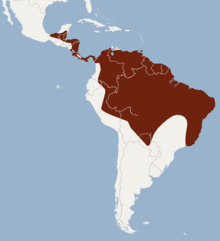Pygmy round-eared bat
The pygmy round-eared bat (Lophostoma brasiliense) is a bat species from South and Central America.
| Pygmy round-eared bat | |
|---|---|
.jpg) | |
| Scientific classification | |
| Kingdom: | Animalia |
| Phylum: | Chordata |
| Class: | Mammalia |
| Order: | Chiroptera |
| Family: | Phyllostomidae |
| Genus: | Lophostoma |
| Species: | L. brasiliense |
| Binomial name | |
| Lophostoma brasiliense Peters, 1866 | |
 | |
Description
Its ears are large with rounded tips. Its upper lip has several small warts. The fur is dark brown or black in color. Its forearm is 33–36 mm (1.3–1.4 in) long. Individuals weigh 9–11 g (0.32–0.39 oz). Its dental formula is 2.1.2.31.1.3.3 for a total of 32 teeth.[2]
Biology and ecology
It is insectivorous, though it may also consume fruit. It is nocturnal, roosting in sheltered places during the day such as hollow trees or within termite mounds.[2]
Range and habitat
It is found in several countries in Central and South America, including: Belize, Bolivia, Brazil, Colombia, Costa Rica, Ecuador, French Guiana, Guatemala, Guyana, Honduras, Mexico, Nicaragua, Panama, Peru, Suriname, Trinidad and Tobago, and Venezuela. It is documented at elevations below 500 m (1,600 ft) above sea level.[1]
Conservation
As of 2016, it is evaluated as a least-concern species by the IUCN. It meets the criteria for this classification because it has a wide geographic range; it is relatively common; it tolerates a variety of habitats; its range includes protected areas; and it is unlikely to be experiencing rapid population decline.[1]
References
- Sampaio, E.; Lim, B.; Peters, S.; Miller, B.; Cuarón, A.D. & de Grammont, P.C. (2016). "Lophostoma brasiliense". The IUCN Red List of Threatened Species. IUCN. 2016: e.T21984A115164165. doi:10.2305/IUCN.UK.2016-3.RLTS.T21984A21975227.en. Retrieved 13 December 2017.
- Medellín, Rodrigo (2014). Ceballos, G. (ed.). Mammals of Mexico. JHU Press. pp. 697–698. ISBN 1421408430.
